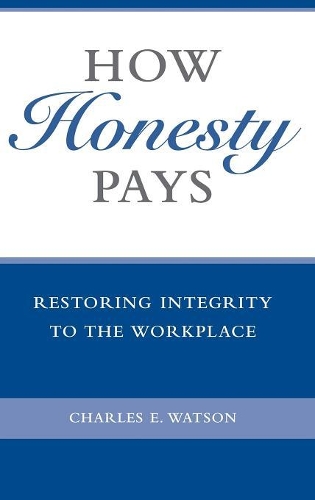
How Honesty Pays: Restoring Integrity to the Workplace
(Hardback)
Publishing Details
How Honesty Pays: Restoring Integrity to the Workplace
By (Author) Charles E. Watson
Bloomsbury Publishing PLC
Praeger Publishers Inc
30th October 2005
United States
Classifications
General
Non Fiction
Office and workplace
658.31
Physical Properties
Hardback
200
Description
Against the all-too-familiar backdrop of corporate scandal and greed, Charles Watson provides what he calls a blueprint to help working men and women, from the tops of organizations to the bottoms, step forward and help restore and defend the integrity of business. Step by step, he outlines fifteen fundamental commandments of honest businessfrom put people first to be your own personcommon-sensical approaches to making decisions, solving problems, and taking action in ways that deliver results without compromising on principles. Using dozens of compelling examples, from companies large and small, Watson demonstrates how honesty, integrity, and trust are at the root of such essential business concepts as creativity and innovation, risk taking, collaboration, attracting and retaining talented people, and anticipating and exceeding customer expectations. He also tackles such complex issues as how to prevent an ethical ego from becoming arrogant and how to stand your ground when faced with unethical competition, resistance from above or below, or the temptation to take the path of least resistance. Ultimately, he provides practical, not abstract or theoretical, recommendations for developing individuals and organizations that encourage authentic relationships, act in ways that society admires, and have the boldness to initiate action with conviction. Watson also tackles such complex issues as how to prevent an ethical ego from becoming arrogant and how to stand your ground when faced with unethical competition, resistance from above or below, or the temptation to take the path of least resistance. He reminds us that integrity is derived from the Latin integritasoneness, a consistency of purpose, word, and deed. Applying this principle, he provides practical, not abstract or theoretical, recommendations for developing individuals and organizations that encourage authentic relationships, celebrate positive achievements, act in ways that society admires, and have the boldness to initiate action with conviction. Ultimately, Watson demonstrates that with courage and humility you can, indeed, do well by doing goodnot only at work, but in all aspects of your life.
Reviews
Watson provides a unique perspective on business and professional ethics. For him there is no gray area; accountability, an inner self, and positive thinking constitute a philosophy of life that is intrinsic to personal and organizational success. What is right is the only acceptable leadership path. To that end, Watson utilizes a series of short vignettes of various companies (e.g., Caterpillar Tractor, UPS, and Toys R Us) to examine contemporary organizational leadership. Covering a range of topics, from avarice to employee welfare and product quality control, Watson illustrates his moral and ethical guidelines: choose the best things over good things, listen to your inner voice, cultivate the right dominating desires, guide your actions by civilization's highest standards, not by your immediate desires, and do things because they are praiseworthy not because they are popular. The author eloquently argues that today's leaders do not have to compromise their moral and ethical principles to achieve personal and professional success. Even those who disagree with Watson's philosophy will find his well-written and timely book interesting. Recommended. General readers, all levels of undergraduate students, and practitioners. * Choice *
Watson offers practical ideas that others have used to achieve greater levels of honesty and integrity, particularly in the workplace, but in other areas of their lives as well. Step-by-step, he discusses 15 key principles about honesty in business, demonstrating the powerful, positive impact honesty and integrity can have on the workplace. Numerous examples of exemplary leaders, such as Jim Casey of UPS, George Schaefer of Caterpillar Tractor, Charles Lazarus of Toys 'R' Us, and Gertrude Boyle of Columbia Sportswear, are incorporated throughout the text. Academic but accessible to the general reader. * Reference & Research Book News *
Author Bio
Charles E. Watson is Professor of Management at Miami University in Ohio. He is the author of six books, including What Smart People Do When Dumb Things Happen at Work and Managing with Integrity (Praeger, 1991).
